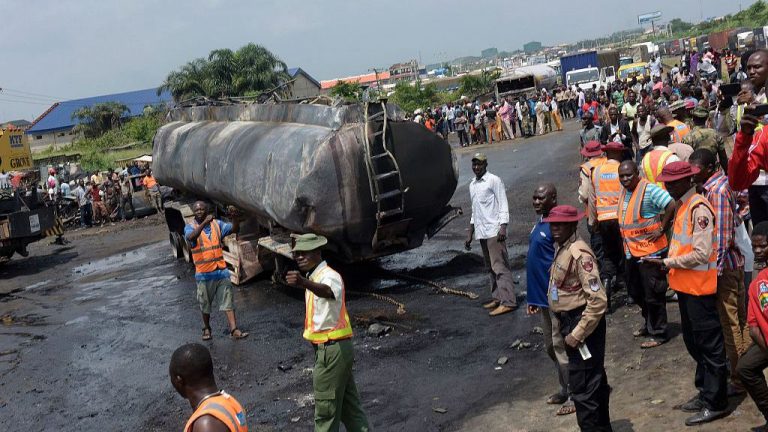In recent years, Nigeria has witnessed a distressing series of fuel tanker and gas cylinder explosions, leading to significant loss of life and property. These incidents not only highlight systemic safety challenges but also underscore the urgent need for comprehensive preventive measures.
By Abdallah el-Kurebe
A grim chronicle of tragedies
In January 2025, a devastating explosion occurred near Suleja, Niger State, when a fuel tanker overturned at Dikko junction. While the local residents gathered to collect the spilled petrol, the site ignited, resulting in a catastrophic blast that claimed at least 98 lives and injured 69 others. The inferno also destroyed approximately 20 shops, causing property losses estimated in the millions of Naira.
Just a week later, in Enugu State, another tanker carrying gasoline lost control on the Enugu-Onitsha Expressway, where a gasoline tanker lost control and collided with 17 vehicles, resulting in an explosion that claimed at least 18 lives and injured 10 others. The victims were reported to be “burned beyond recognition,” underscoring the severity of the incident. These events are part of a broader pattern.
On October 2024, an overturned fuel tanker in Jigawa State led to an explosion that killed over 140 people, many of whom were attempting to scoop fuel. These fatal disasters have followed a thread of avoidable life-threatening explosions.
Contributing factors
Several factors contribute to the frequency and severity of these incidents:
- Poor vehicle maintenance and driver training: Many fuel tankers are not adequately maintained, and drivers often lack proper training, increasing the risk of accidents.
- Infrastructure deficiencies: Nigeria’s road infrastructure is often in poor condition, contributing to vehicular accidents.
- Economic hardship: The removal of fuel subsidies has led to higher fuel prices, prompting individuals to engage in the dangerous practice of fuel scooping from accident sites.
- Lack of public awareness: There is insufficient public knowledge about the dangers associated with fuel scooping and improper handling of gas cylinders.
Preventive measures
To address these challenges, a multifaceted approach is necessary:
- Stricter regulations and enforcement: The government must implement and enforce rigorous safety regulations for fuel transportation. This includes regular inspections of tankers and ensuring they are equipped with safety features such as anti-spill valves.
- Public education campaigns: Raising awareness about the dangers of fuel scooping and improper gas cylinder usage is crucial. Educational programs can inform the public about safe practices and the risks involved in handling flammable materials.
- Improved emergency response: Enhancing the capacity of emergency services to respond swiftly to accidents can mitigate the impact of such incidents. This includes better training for first responders and investment in necessary equipment.
- Economic interventions: Addressing the underlying economic issues that drive individuals to engage in risky behaviors, such as fuel scooping, is essential. Providing alternative livelihood opportunities and financial support can reduce the temptation to partake in such dangerous activities.
- Infrastructure development: Investing in road infrastructure improvements can reduce the likelihood of accidents involving fuel tankers. he recurring nature of these tragedies underscores the need for immediate and sustained action.y implementing comprehensive safety measures, enforcing regulations, and fostering public awareness, Nigeria can work towards preventing future occurrences and safeguarding its citizens.
Although President Bola Tinubu has committed to a “swift and comprehensive” review of fuel transportation safety protocols across the country, beyond rhetoric, government, as a matter of urgency, should convene a “Summit on Tanker and Gas Cylinder Disasters”, where critical stakeholders in disaster prevention and management, will gather to find lasting solutions to the malaid.
I believe that, in addressing the frequent tanker and gas cylinder explosions in Nigeria, there is the need for a coordinated effort from multiple stakeholders.
Federal Road Safety Corps
The FRSC can contribute in Driver Training and Certification: This will be done by way of implementing comprehensive training programs for tanker drivers, emphasizing safe driving practices and emergency response.
The Corps can also help in the Enforcement of Safety Regulations: This will be to conduct regular inspections to ensure tankers meet safety standards and enforce penalties for non-compliance.
National Emergency Management Agency
The NEMA can contribute in Disaster Preparedness and Response: This will be done by developing and regularly updating disaster response plans specific to tanker and gas cylinder incidents.
The Agency can also help in Community Sensitization: This is by educating the public on the dangers of approaching accident scenes and the importance of prompt reporting.
Petroleum tanker drivers association
This Association, beyond employing staff to drive their vehicles, can help in Self-Regulation: This will be done by establishing internal safety protocols and ensure members adhere to best practices in fuel transportation.
Similarly, the Association could collaborate with authorities: This will be done by working closely with regulatory bodies to report unsafe practices and participate in safety drills.
Oil marketing companies
Oil companies would invest on infrastructure development. This will be done by developing pipelines and rail networks to reduce reliance on road transportation of fuel, thereby minimizing tanker-related risks.
They will also help in the maintenance of equipment by way of ensuring that tankers and gas cylinders are regularly inspected and maintained to prevent leaks and explosions.
Federal and state governments
These will help in the formulation and enforcement of safety policies. This will be be enactung and enforcing stringent safety regulations governing the transportation and storage of fuel and gas.
They will also organise public awareness campaigns. This will be done by launching nationwide campaigns to inform citizens about the risks associated with fuel-related accidents and the importance of safety compliance.
By leveraging the strengths and responsibilities of these and other stakeholders like the CAID, Red Cross, USAID, etc, Nigeria can develop a comprehensive strategy to mitigate the risks associated with tanker and gas cylinder explosions.


